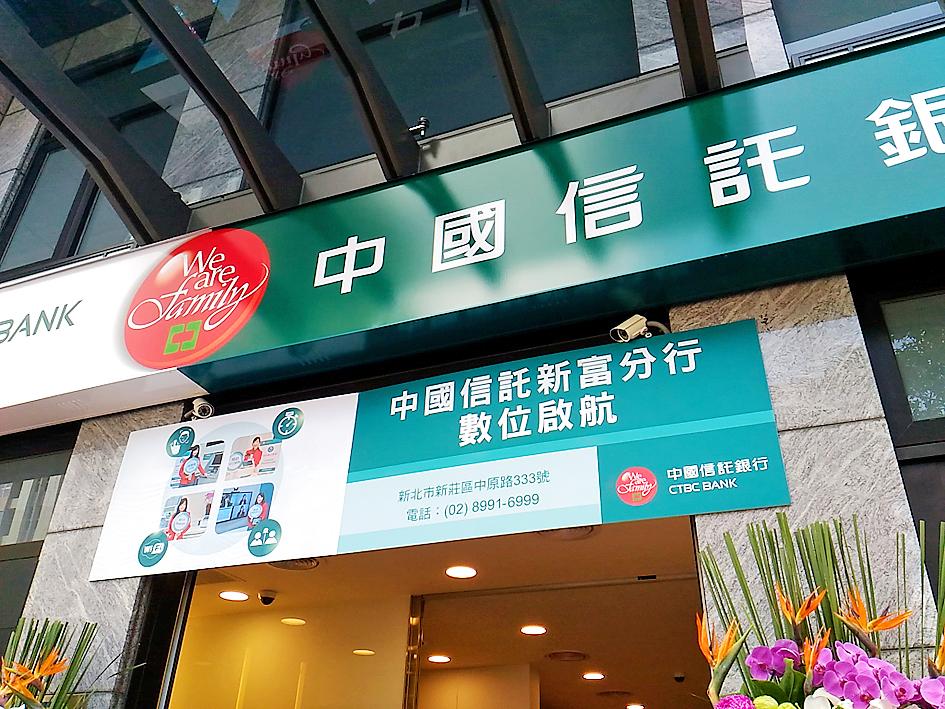With a brand value of US$1.382 billion, CTBC Bank (中國信託銀行) was named the most valuable banking brand in Taiwan for the seventh time last year, and the world’s 153rd-most valuable brand, according to a report on the world’s 500 biggest banking brands released by Brand Finance and The Banker magazine.
The bank’s brand value has increased by more than 40 percent in the past three years, more than any other bank in Taiwan and outpacing the industry in Asia. The authors of the report named CTBC Bank the Taiwanese market’s leader.
Brand Finance, a brand research institution founded in the UK in 1996, values more than 5,000 brands from around the world and announces the 500 most valuable corporate brands every year.

Photo: Lee Chin-hui, Taipei Times
The report used quantitative financial analysis and qualitative aspect evaluation to devise the organization’s brand strength index, brand loyalty rate and forecast revenues. Through these, it calculated the brand value of institutions to compile the global 500 list.
The authors estimated that, due to the COVID-19 pandemic, two-thirds of the world’s 500 biggest banks lost value last year.
Despite this, CTBC Bank moved up 21 positions in the ranking, and its brand value continues to increase. With an “A+” credit ranking, CTBC Bank is now Taiwan’s highest-valued banking brand.
According to Brand Finance, CTBC Bank has played an important role in assisting the public in dealing with the effects of the pandemic, with digital financial technologies accelerating the review process of applications for relief funds by more than 280,000 workers, placing CTBC above the pack in indicators such as consumer satisfaction and corporate social responsibility.
The bank has performed well in a range of indicators in the survey. In addition to business performance, it also leads other Taiwanese banks in areas such as employee recognition and community investment, showing how CTBC not only pursues performance growth, but also uses its corporate soft power to coalesce its employees’ identification with the brand and the company.
The bank has also long worked in five areas of public interest — charities, anti-drug initiatives, sports, education and the arts — showing its proactive commitment to financial inclusion and social sustainable development to implement its “we are family” brand spirit and “protect and build” corporate mission.

UNCERTAINTY: Innolux activated a stringent supply chain management mechanism, as it did during the COVID-19 pandemic, to ensure optimal inventory levels for customers Flat-panel display makers AUO Corp (友達) and Innolux Corp (群創) yesterday said that about 12 to 20 percent of their display business is at risk of potential US tariffs and that they would relocate production or shipment destinations to mitigate the levies’ effects. US tariffs would have a direct impact of US$200 million on AUO’s revenue, company chairman Paul Peng (彭雙浪) told reporters on the sidelines of the Touch Taiwan trade show in Taipei yesterday. That would make up about 12 percent of the company’s overall revenue. To cope with the tariff uncertainty, AUO plans to allocate its production to manufacturing facilities in

TAKING STOCK: A Taiwanese cookware firm in Vietnam urged customers to assess inventory or place orders early so shipments can reach the US while tariffs are paused Taiwanese businesses in Vietnam are exploring alternatives after the White House imposed a 46 percent import duty on Vietnamese goods, following US President Donald Trump’s announcement of “reciprocal” tariffs on the US’ trading partners. Lo Shih-liang (羅世良), chairman of Brico Industry Co (裕茂工業), a Taiwanese company that manufactures cast iron cookware and stove components in Vietnam, said that more than 40 percent of his business was tied to the US market, describing the constant US policy shifts as an emotional roller coaster. “I work during the day and stay up all night watching the news. I’ve been following US news until 3am

COLLABORATION: Given Taiwan’s key position in global supply chains, the US firm is discussing strategies with local partners and clients to deal with global uncertainties Advanced Micro Devices Inc (AMD) yesterday said it is meeting with local ecosystem partners, including Taiwan Semiconductor Manufacturing Co (TSMC, 台積電), to discuss strategies, including long-term manufacturing, to navigate uncertainties such as US tariffs, as Taiwan occupies an important position in global supply chains. AMD chief executive officer Lisa Su (蘇姿丰) told reporters that Taiwan is an important part of the chip designer’s ecosystem and she is discussing with partners and customers in Taiwan to forge strong collaborations on different areas during this critical period. AMD has just become the first artificial-intelligence (AI) server chip customer of TSMC to utilize its advanced

Six years ago, LVMH’s billionaire CEO Bernard Arnault and US President Donald Trump cut the blue ribbon on a factory in rural Texas that would make designer handbags for Louis Vuitton, one of the world’s best-known luxury brands. However, since the high-profile opening, the factory has faced a host of problems limiting production, 11 former Louis Vuitton employees said. The site has consistently ranked among the worst-performing for Louis Vuitton globally, “significantly” underperforming other facilities, said three former Louis Vuitton workers and a senior industry source, who cited internal rankings shared with staff. The plant’s problems — which have not